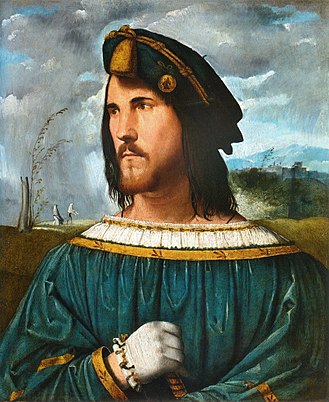The Cardinal who would be Prince
 August 17 is a red-letter day in the annals of dubious achievements. For it was on this date in 1498 that for the first time ever a cardinal of the Roman Catholic Church resigned his office.
August 17 is a red-letter day in the annals of dubious achievements. For it was on this date in 1498 that for the first time ever a cardinal of the Roman Catholic Church resigned his office.
Now you might be thinking, with Benedict XVI in mind, that it’s not an admirable rather than dubious achievement. Someone humbled by their incapacity to perform this exalted office, laying it aside instead of clinging to the pomp and prestige. (Or you might just hate the church and wish they’d all resign, but that’s a topic for another day.)
The problem is, the person who resigned back then was Cesare Borgia. Now clearly he should never have been a cardinal due to his enthusiastic embrace of murderous wickedness, not to mention that he was the illegitimate son of the Pope who made him a cardinal, Alexander VI. (OK, he was just Roderigo Cardinal Borgia when he had Cesare, and probably he didn’t poison people, at least not much, but still.) But Cesare only resigned the post in order to further his and his father’s ambitions by becoming Duke of Valentinois.
It didn’t work. After his father died in 1503, followed after only 26 days by his sympathetic successor Pius III, he was tricked into supporting a deadly family foe Giuliano Della Rovere for the papacy, as Julius II. Four years later Borgia fell into an ambush and was mortally wounded and stripped of everything but a red fig leaf, even the leather mask he wore apparently to hide the ravages of syphilis. Again not the ideal accoutrement for a cardinal.
Cesare Borgia’s career was, apparently, a significant inspiration for Machiavelli’s The Prince. Which might make you question Machiavelli’s judgement as well as his morals except for one point about his infamous book that has been almost universally overlooked lately. The Prince is supposedly the ultimate how-to guide to amoral realism, a kind of Achieving Brutally Cynical Power for Dummies. But in the 18th century it was generally seen, correctly in my view, as a satire, a thinly, even transparently veiled scathing denunciation of power-mad cynics.
If you really were a cynic and tutor to cruel dictators, you would not take as your role model someone whose nasty career ended with ignominious and degrading death in his early 30s. Even if he did at least vacate the cardinalship while vertical, for base motives.